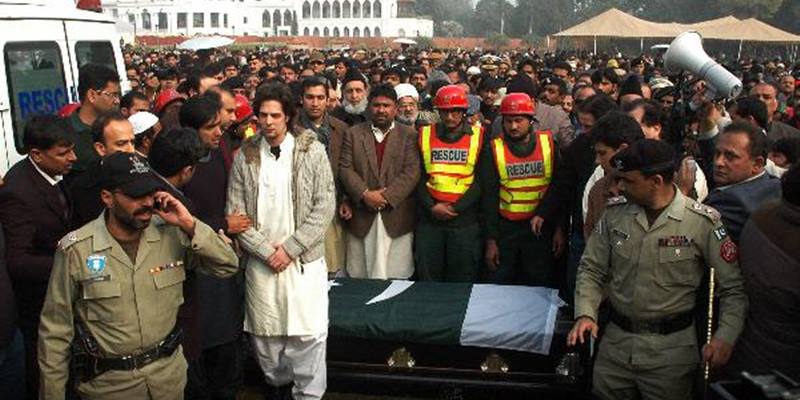Salman Masood [NATION]
ISLAMABAD // Analysts said yesterday that the assassination of Salman Taseer shows the extent of extremism in a deeply divided society where tolerance is fast vanishing and leaders face mounting risks.
The 66-year-old governor of Punjab, who was a close friend of the president, Asif Ali Zardari, was buried in Lahore yesterday in a funeral attended by thousands of supporters and workers of the Pakistan Peoples Party (PPP).
The liberal politician was killed in Islamabad on Tuesday by one of his security guards because of his campaign to repeal the country’s blasphemy law.
A top aide to Mr Zardari said the bodyguard, Mumtaz Qadri, 26, had been labelled a security risk months before by the police department he worked for.
Faisal Raza Abdi said the Punjab province police’s assessment of Qadri states he should not be deployed to protect high-profile figures because of his ‘extremist views’.
Lawyers showered Qadri with rose petals when he arrived at court yesterday and an influential Muslim scholars group praised the assassination of the outspoken opponent of laws that order death for those who insult Islam.
Qadri made his first appearance in an Islamabad court, where a judge remanded him in custody a day after he allegedly sprayed automatic gunfire at Taseer. A rowdy crowd slapped him on the back and kissed his cheek as he was escorted inside.
The lawyers who tossed handfuls of rose petals over him were not involved in the case. As he left the court, about 200 sympathisers chanted “death is acceptable for [the Prophet] Mohammed’s slave”. The suspect stood at the back door of an armoured police van with a flower necklace given to him by an admirer and repeatedly yelled “God is great”.
The funeral was attended by the prime minister, Yusuf Raza Gilani, and other top government officials. Mr Zardari did not attend but vowed to bring the perpetrators to justice.
The assassination comes as the ruling PPP has lost its majority in the national assembly and the prime minister is scrambling to form a coalition.
The killing has greatly exacerbated the sense of political and religious crisis in the country. At stake are not only campaigns against religious extremism – a manifestation of which was opposition to the blasphemy law – but the broad economic and financial reforms that the United States has been pushing in the country.
The US secretary of state, Hillary Clinton, said in a statement that “his death is a great loss” and that she “admired his work to promote tolerance”.
Taseer’s vociferous and blunt opposition to the blasphemy law had roiled the country’s religious forces. His western, liberal life style was a sharp contrast to the conservative, increasingly religious complexion of the Pakistani society.
His assassination is likely to embolden the extremists and further isolate and alienate the liberal progressive forces, according to his friends and analysts.
“At a time when the ruling Pakistan Peoples Party is beset by political problems and unable to take a clear stance on public issues, Salman Taseer had emerged as a rallying figure regarding human rights issues,” said Raza Rumi, the contributing editor of The Friday Times, a Lahore-based weekly, and a friend of the Taseer family.
“He had no power; he could not introduce any law but his symbolism and leadership was a great support to those who want to see a thriving liberal, secular democratic Pakistan. After his death, the secular democratic elements have nobody to look up to,” Mr Rumi lamented.
“The brutal killing is a message for the scattered, small minority of secular democrats that their public position is no longer acceptable. They will simply be silenced.”
Other analysts echoed the sentiment.
“Taseer’s assassination demonstrates a troubling consensus in Pakistan that it’s legitimate to murder those who commit blasphemy or somehow abet it,” said Arif Rafiq, a political analyst based in Washington that provides strategic guidance on Middle East and South Asian political and security issues.
“Many Pakistani commentators, while condemning the governor’s murder, make a false equivalence between Taseer’s so-called liberal extremism and the murderous extremism of the country’s religious radicals. If Pakistanis cannot come to terms with the injustice of Taseer’s murder, there’s certainly the potential they will be eventually consumed by this disease of extremism pervading their land.”
Mr Rafiq added: “The loss of Taseer is a big blow to Zardari’s PPP, which lacks a leader in the pivotal province of Punjab. In 2011,
Pakistan could see new elections ushering in a coalition of the centre-right and Islamists into power in Islamabad. These parties certainly won’t support religious reform in the country.”
He said the fact that Taseer was murdered by his own bodyguard will cause politicians to be “even more deferential to the radicals, fearing for their own lives”.
That extremists get easily recruited into the state security apparatus has rattled nerves in the country. “The extremists have not only penetrated the security forces but also achieved their target. Who knows how widespread they are now in the law enforcing agencies, which are meant to protect ordinary citizens and officials,” said Mr Rumi.
Some PPP officials said the assassination could serve as a catalyst to unite the country against extremism.
“Governor Taseer’s assassination is likely to create backlash, energising the anti-extremist base of the PPP,” said a party official and close aide to Mr Zardari.
But initial signs yesterday indicated that the party was already inching away from further provoking religious sensitivities as some officials dismissed the possibility that the assassination was a random, isolated incident, inspired by religious overzealousness and couched the murder as a political conspiracy.



